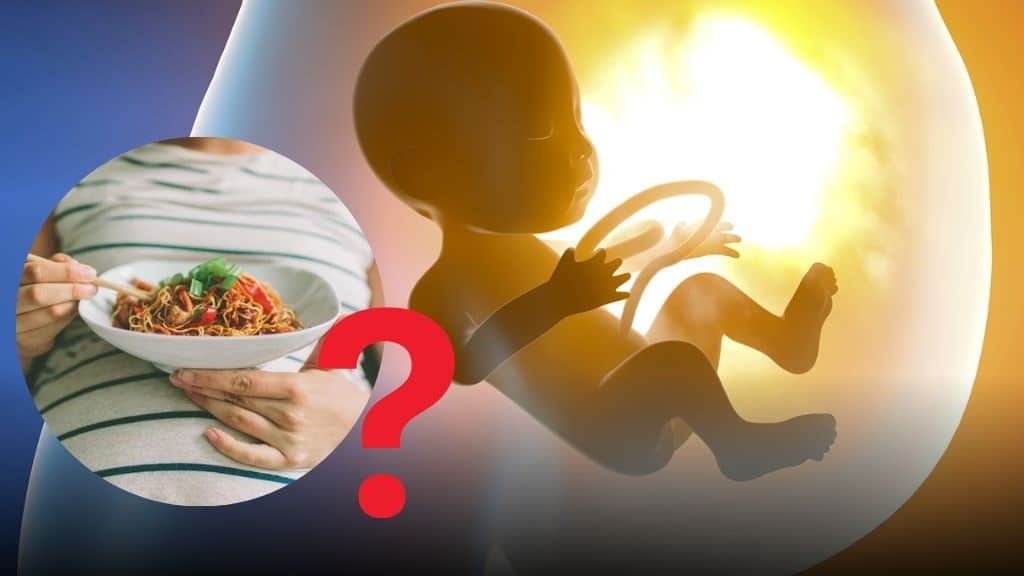
Table of Contents
Can You Eat Spicy Food While Pregnant?
You used to love low-to-medium spicy food, but now that you’re pregnant, you want anything with the word “heat” in it, like roasted cauliflower, chicken wings, and potato chips from the convenience store.
Are you and your little human safe from all that heat? If your pregnancy craving is putting hot sauce on almost everything, can you eat spicy food while pregnant is a question that haunts you? Seriously, the only safest food at this point is your breakfast cereal and the dishes mentioned in this pregnancy meal plan.
Does Eating Spicy Food While Pregnant Mean Anything?
When you’re pregnant, you crave weird combinations of things, most of which make no sense at all: from pickles with ice cream, hamburgers with strawberry jam, and canned tuna with marinara sauce. Typically, there is only one explanation for all these crazy food cravings: pregnancy hormones.
There is no secret to understanding your cravings, but there are some myths about why many pregnant women crave spicy foods. Some think it happens more if you’re having a baby boy, while others keep thinking maybe it’s some kind of natural inclination to cool down your body temperature because eating hot food makes you sweat, and perspiration brings down your body temp.
Regardless, pregnancy and postpartum recovery change your taste buds frequently, so don’t worry if you suddenly want 3 AM chili. It probably doesn’t indicate anything serious.
But Is Your Baby Okay With Eating All That Spice?
Does spicy food affect babies in the womb? Here’s some spicy news: Eating spicy food during pregnancy is safe for your child. Really! It won’t hurt your child. However, there is a small word of caution: according to a 2019 systematic review by Joanne M Spahn et al, eating certain foods while pregnant can alter the “flavor” of your amniotic fluid. However, the consumption of spicy foods has not been the specific subject of any studies.
But all those chicken wraps could be influencing your baby’s taste buds, and they might later show a preference for certain familiar flavors. That isn’t a bad thing, just a reminder.
Are Spicy Foods Safe For Mom?
Here’s a bit of caution: Although it is not harmful to your baby to consume a lot of spicy food, you may experience some undesirable side effects. Nothing dangerous, but the discomfort of heartburn, GI distress, and indigestion may always not be worth satisfying the craving.
- Start with gentle foods if you’re not used to eating spicy foods but your pregnancy has made you crave chili peppers.
- Avoid eating spicy foods frequently or in large quantities.
- Be sure to drink plenty of water.
- Choose high-quality ingredients and wash your hands after handling peppers when preparing spicy food safely.
And instead of immediately reaching for that ghost pepper Tabasco with the skull and crossbones on the label, do your best to gradually increase your heat tolerance, OK?
Can You Eat Spicy Food While Pregnant With Zero Side Effects?
Craving spicy food during pregnancy has various bad and good impacts on yourself as well as your child. Eating spicy food while pregnant can:
Increase Heartburn Due To Acid Reflux
Heartburn is a common problem for pregnant women, and spicy foods can make it worse for some. Heartburn occurs when stomach acids return to the esophagus because pregnancy hormones relax the valve between the stomach and the esophagus. Although heartburn can occur at any stage of pregnancy, it is most common during the third and fourth trimesters when the growing baby pushes your stomach acids up into your throat.
Trigger Pain In The Abdomen
Spicy foods do not cause ulcers in the stomach; capsaicin, the chemical that gives peppers their bite, may even heal ulcers. However, people who have already been diagnosed with ulcerative colitis or Crohn’s disease may experience symptoms of inflammatory bowel disease (IBD) when they consume spicy foods.
Improve Your Health
The spicy chemical found in peppers, capsaicin, has anti-inflammatory properties. A few scientists accept that spicy food sources might strengthen your immune and cardiac systems.
Expand Your Baby’s Palate
Your baby consumes what you eat during pregnancy. Through your amniotic fluid, the flavors in your diet are transmitted to your baby. Your baby’s taste buds fully develop by 15 weeks of pregnancy and she is swallowing amniotic fluid, so she probably already tastes your meals. Eat a variety of flavors and spices to encourage an adventurous eater, as research shows that your baby’s later preferences are highly influenced by what you eat.
What Are The Effects of Spicy Food Semester-wise?
Eating spicy food during the first trimester is unlikely to cause a lot of problems, but it can make morning sickness worse. Spicy foods may make things worse if you already struggle with all-day bloating and gas. Eating spicy food in the second and third trimesters might cause:
- Heartburn, as your developing uterus powers stomach acids higher into your throat
- Nausea
- Indigestion
- Bloating, gas, and diarrhea
- Other gastroesophageal reflux (GERD) side effects
Can You Eat Spicy Foods While Pregnant To Induce Labor?
Can certain foods induce labor? Are spicy foods one of them? Everyone from your mother to your grandmother to the guy in the apartment next door will probably tell you to eat something spicy if you’re getting close to the end of your pregnancy and want to start your labor sooner.
In 2011, researchers actually investigated it alongside other labor shortcuts like sex, walking, and laxatives. 201 postpartum women were surveyed to find out if they had attempted to induce labor naturally and, if so, how; 20% of the 50% who claimed to have induced labor themselves claimed to have consumed spicy foods to accomplish their goal.
The only issue? There is no scientific evidence to support this. Consuming a plate of wings won’t suddenly make your body ready for birth if you’re healthy at 38 weeks with no dilation.
Precautions for Eating Spicy Foods During Pregnancy
You might be willing to put up with the heartburn that comes from eating spicy food if it means you can satisfy a strong craving. However, keep in mind that it is not as simple to get rid of pregnancy heartburn as it was when you were before pregnancy. Pregnant women should not take all over-the-counter medications for indigestion, heartburn, or nausea. Call your healthcare provider if you’re encountering serious or steady GI side effects, as:
- Bloating
- Cramps
- Gas
- Burning Pain
- Diarrhea
So What’s The Bottom Line?
Can you eat spicy food while pregnant? Listen: You have the stomach for dealing with diarrhea, gas, burning pain, cramping, and bloating then may be you can have as many chili peppers as you want. BUT, of course, get your green signal from your doctor. You and your baby won’t be hurt by it. Start slowly if you’re not used to spice in your pre-pregnancy days, and if you start experiencing unfavorable side effects, reduce the amount of food you douse in spice and how frequently you use it.
So, can pregnant women eat spicy foods? YES. Just read the precautions above!
FAQs: Spicy Food During Pregnancy
1. What happens if we eat spicy food during pregnancy?
2. Can I eat chili while pregnant?
3. What spices should be avoided during pregnancy?
Sources:
Reviewed By:

Jessica - Nutritionist Dietician
Jessica is the owner and registered dietitian nutritionist at Nutrition That Heals, LLC. She started her dietetics career working in acute care where she gained a great deal of invaluable experience, learning all about different disease states and their appropriate nutrition interventions. She then worked in long term care where she was able to develop her skills and knowledge base dealing with the elderly population. Following long term care, she worked as an outpatient dialysis dietitian, working with patients to help them eat their best for their kidney failure and often other health conditions (diabetes, heart disease, etc.). She then made the jump back to be an inpatient clinical dietitian. There, she was able to work with patients with strokes, cancer, orthopedic issues, as well as the pediatric population. During her most recent time working as an inpatient clinical dietitian, a great opportunity presented itself and it was a great way to move into focusing more on her dream of opening a private practice. She currently works full time as a contract dietitian with Dietitians on Demand conducting 1:1 nutrition counseling sessions while also working with patients here at Nutrition That Heals, LLC. She has been grateful enough to know how powerful good nutrition can be, but after being diagnosed with endometriosis in March 2022, she had to fully focus on the importance of anti-inflammatory foods, proper hydration, and self-care. This diagnosis motivated her to put pen to paper and get her business started - she wanted to teach what she had learned to others - food should be nourishing. Jessica wants to show you how you can heal with good nutrition, and feel your absolute best!










